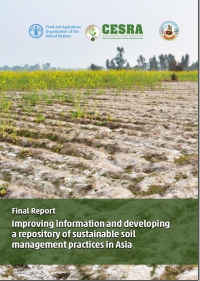Final Report Improving Information and developing a repository of sustainable soil management practices in Asia

Year: 2023
Place: Thailand
Pages: 192
ISBN/Code:
Author: Center of Excellence for Soil Research in Asia (CESRA)
Co-Author:
By Country: Thailand
Publisher: CESRA
Keyword: CESRA
Abstract: Land degradation is one of the biggest threats to food security and agriculture in Asia and the Pacific. Approximately 25% of all land in the region is degraded, with 13% classified asseriously degraded, leading to soil erosion and fertility losses, increased flash floods and landslides that particularly affect the poor and marginalized minorities. Asia is home to 37.2% of the global arable land and the largest area of land under degradation.The Regional Assessment of Soil Change in Asia, as part of the Status of World’ Soil Resources( FAO, 2015) highlights the following main threats to soil in the region 1) Erosion; 2) Soil organic carbon change; 3) Soil salinization and sodification and 4) Nitrogen imbalance. These threats are driven by compounded impacts of population growth, industrialization, urbanization, unsustainable agriculture, and climate change. In 2019, the Fifth Asian Soil Partnership ( ASP) Plenary Meeting held in New Delhi, India recommended and endorsed the establishment of the Center of Excellence for Soil Research in Asia ( CESRA) . The major mission of CESRA is to support ASP countries in achieving sustainable soil management with coordinated actions on soil protection,management and restoration in the regions and mitigate the negative impacts on food production and food security as well as sustaining provision of ecosystem services and climate change adaptation. CESRA is also expected to promote the exchange of knowledge, data, and experience in the region through, among others, the promotion and implementation of the Southeast Asia Laboratory Network ( SEALNET) with data harmonization and standardization and facilitate technical cooperation. The CESRA Secretariat was established in the Land Development Department ( LDD) , Thailand. The CESRA will serve as the regional hub for advancing targeted soil research based on regional priorities to feed decision making. FAO Thailand has supported the development of an operational strategy and work plan for CESRA through the TCP project and strengthening technical capacity for soil testing laboratories with harmonization of soil data and information and the establishment of the National Thai Soil Laboratory Network. In 2021, A Global Map of Salt Affected Soils (GSASmap) is available through the Global Soil Partnership ( GSP).
Reference: CESRA
Website/Link:
Date 30 August 2023

